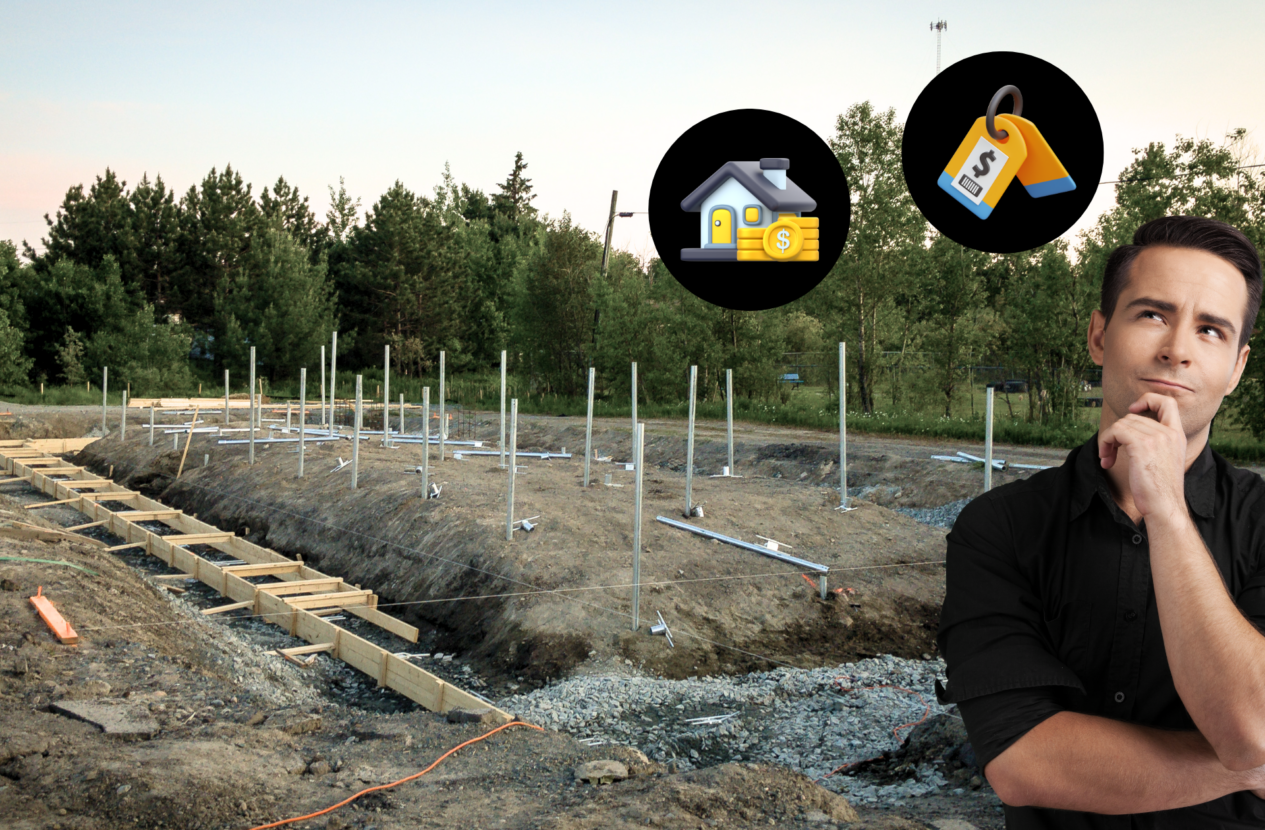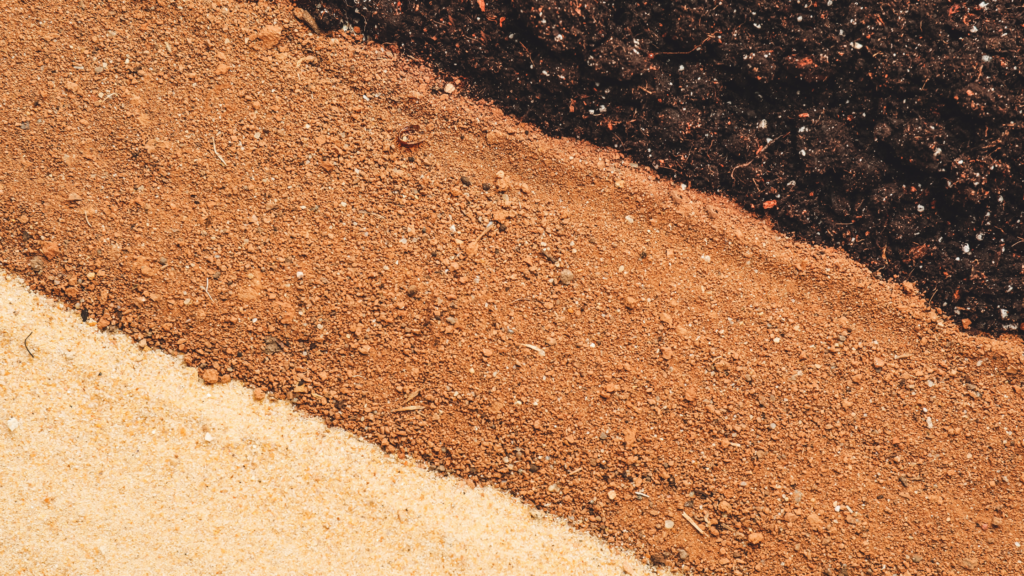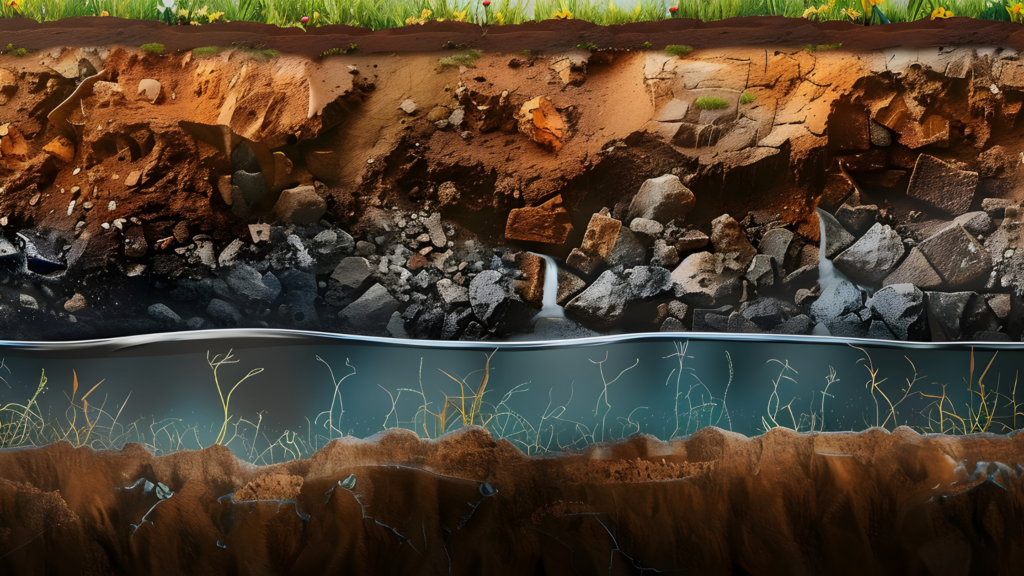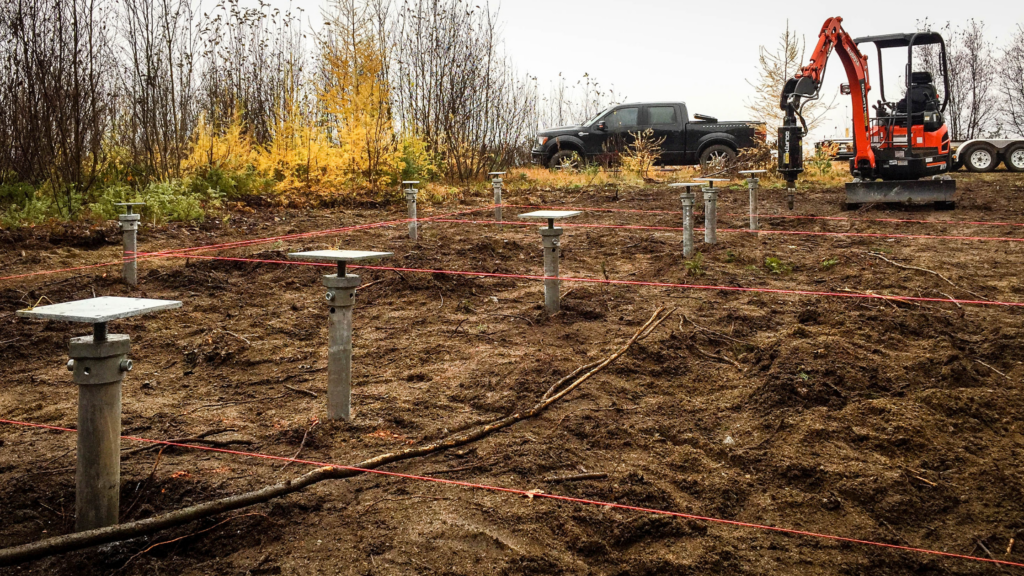House foundation costs: 10 key factors that significantly affect pricing
GoliathTech - 18 July 2024

(pst… You’ll also discover why building a house foundation should include the installation of screw piles for the durability of your investment!)
During the construction of a house, the foundation is a critical stage that requires special attention. The cost of the foundation can vary based on several factors, including the region and the choice of contractor, the type of soil, the complexity of the construction zone, as well as the type of foundation, the dimensions of the foundation, the accessibility of the site, and other varying costs according to the needs of the project.
This article explores the factors that impact the cost of each and how the integration of GoliathTech screw piles into your project is effective and cost-efficient, especially for difficult soils.
It’s certain that building a foundation represents several thousand dollars, but this is a comprehensive article that will help you make the best choices possible.
Here is a summary of the factors that will influence the price of building your house foundation:

Region or city and the choice of contractor
When choosing a contractor for a foundation project, it is crucial to compare several bids due to significant cost variations between contractors, often due to differences in profit margins.
It is essential to clarify all inclusions and exclusions in the bids to avoid any surprises, ensuring everything is put in writing and signed by the contractor.
Conducting online research and consulting customer reviews can help assess the reputation and reliability of contractors.
Taking the time to carefully compare bids from several professionals ensures finding quality service at a fair price.
Moreover, costs can also vary from one region to another based on the costs of materials and the cost of living, which influence the prices of labor and supplies.
These regional differences should be taken into account when planning and estimating the costs of your foundation project.

Soil type
Before choosing the type of foundation and evaluating the associated costs for your construction project, it is crucial to consult foundation experts and your local screw pile installer to determine the soil nature on your property. The composition and characteristics of the soil significantly impact the choice of foundation type, the number of piles to install, and the associated costs.
Clay soil: This soil type contracts and expands depending on moisture levels, requiring deep and reinforced foundations to ensure stability. Screw piles are installed beneath the foundation footing, offering better stability against soil movements.
Sandy soil: Although it provides good drainage capacity, this soil requires rigorous compaction to ensure a stable base. Screw piles add superior strength to the foundation.
Rocks: Very stable, but excavation can be costly and laborious. Screw piles help reduce the depth needed to achieve the desired solidity, minimizing excavation costs.
Marshy soil: Extremely unstable, often requiring screw piles to prevent soil movement. The installation of piles in this type of soil is simple and quick, requiring little to no excavation and pumping.

Complexities of the construction zone
Water Table
A high water table level can lead to water infiltration problems, requiring additional waterproofing measures and suitable drainage systems.
Unlike traditional concrete foundations that demand intensive groundwater pumping, screw piles are installed directly into the soil without excavation, thus avoiding the need for pumping.
This method reduces the impact of the water table on the site, saving time and money while minimizing environmental repercussions. Reach out to your local GoliathTech screw pile expert to safely carry out your foundation project.
Seismic zones
Seismic zones require foundations specially designed to withstand shakes.
Screw piles offer exceptional earthquake resistance due to their natural flexibility, deep anchoring, and ability to evenly distribute loads.
This design helps dissipate seismic energy and ensures better stability of the structure.

Types of foundation accessibility, and the number of linear feet of foundation
When planning the construction of your home’s foundation, it is essential to consider various associated costs to avoid any surprises.
The cost of a house foundation varies depending on several factors, such as the size of your house, access to the site, and the type of foundation chosen.
House Size
The size of the house directly influences the cost of the foundation. The larger the house, the more extensive the foundation needs to be, which implies a proportional increase in materials needed, such as concrete and steel reinforcement, as well as labor hours for excavation, formwork, and pouring the foundation. For example, a house measuring 33 feet by 40 feet will require more resources than a house measuring 24 feet by 28 feet, resulting in higher costs.
Accessibility of the Site
Site accessibility is another critical factor. If the site is easily accessible by construction equipment, costs can be reduced. Conversely, if the site is difficult to access, such as in densely populated urban areas or steep terrains, additional costs may arise for transporting materials and necessary equipment. Moreover, space constraints may require specialized construction techniques, which increase costs.
Selected foundation type
The type of foundation chosen (slab on grade, crawlspace, full basement, etc.) also impacts the cost. Each type of foundation has its own requirements in terms of materials and construction techniques. For example, a full basement foundation requires deeper excavation and additional waterproofing and insulation measures, which increase costs compared to a slab on grade, which is generally simpler and less expensive to install.
Specific needs, such as drainage systems, seismic zone reinforcements, or the integration of helical piles, especially for unstable soils, can add additional costs.
Here is a detailed analysis of the types of foundations and their associated costs, as well as other potential costs that might arise.
1. Foundations with a full or partial basement:
Foundations with a basement involve deep excavation, which can be problematic in rocky or marshy soils. To these costs, one must add expenses for waterproofing, thermal insulation, and the installation of drainage systems to prevent moisture and water infiltration.
Heating and finishing the basement can also increase costs. Integrating helical piles under the foundation footing can significantly strengthen this structure, providing increased stability and better resistance to soil movements.
Integration of Helical Piles under the foundation footing:
Helical piles are installed deep into the stable ground, beneath the foundation footing, allowing the transfer of structural loads to stronger soil layers. This technique offers several advantages:
Increased Stability: By anchoring the helical piles deep into the ground, the foundation becomes more stable, even on difficult terrains such as rocky or marshy soils. The piles are installed using a helix and calculated compression, ensuring they do not move once in place. This reduces the risks of differential settlement and foundation movements, thereby ensuring a solid base for the structure.
Crack Prevention: Helical piles prevent cracks caused by freezing and thawing as well as soil expansion. By keeping the foundation footing stable and anchored, the piles minimize the effects of soil movements due to temperature variations and volume changes in clay soils.
Moisture Risk Reduction: Helical piles help keep the foundation footing elevated above high soil moisture levels. Combined with proper waterproofing and an effective drainage system, this can significantly reduce the risks of water infiltration into the basement.
Durability: Made of galvanized steel, helical piles resist corrosion and degradation, ensuring increased longevity of the foundation. They offer durable protection against natural forces that can affect the stability of the structure.
Installation Flexibility: Helical piles can be installed with minimal disruption on the construction site, even in narrow or difficult-to-access areas. This allows for a quick and efficient installation, reducing construction time and costs.
Advantages of a full basement foundation:
Additional space for utility or living areas.
Potential to add rooms, offices, or recreation areas.
Increased stability and durability through the integration of helical piles under the foundation footing.
Prevention of cracks due to freeze-thaw cycles and soil expansion.
Disadvantages of a full basement foundation:
High excavation and construction costs.
Risk of moisture and water infiltration (mitigated by the use of helical piles and good waterproofing practices).
2. Crawlspace foundation with Helical Piles
A crawlspace foundation elevates the house 1 to 3 feet above the ground, providing just enough space to crawl on all fours. This type of foundation is often favored in humid climates as it raises the house above the damp soil.
Crawlspaces are fully enclosed and cannot be used as living spaces. They typically serve as a space for plumbing pipes and other utility installations. While some homeowners might consider using them for storage, this is not recommended. Soil moisture can damage stored items, especially those made from organic materials like paper or items stored in cardboard boxes.
Additional costs may include insulation, ventilation to prevent moisture buildup, and the installation of a vapor barrier to prevent mold issues.
Using Helical Piles for crawlspaces
Helical piles can provide an ideal foundation for crawl spaces. Due to their rapid and minimally invasive installation, they allow for the creation of a solid and stable base to elevate the house without requiring extensive excavation work. Helical piles are particularly suited for challenging terrains, such as clay or marshy soils, where they provide better stability and minimize the risk of settling.
Using Helical Piles for crawlspaces offers several benefits:
Increased Stability: Helical piles are anchored deeply into the ground, providing superior stability compared to traditional foundations, even in difficult soil conditions.
Moisture Protection: By elevating the house, helical piles help keep the crawlspace dry, thereby reducing the risks of moisture and mold.
Durability: Helical piles are made of galvanized steel, which is resistant to corrosion and degradation, ensuring a longer lifespan for the foundation.
Rapid Installation and Minimal Disruption: The installation of helical piles is quick and causes little disruption on the site, thus reducing construction time and costs.
Advantages of a crawlspace foundation:
Less costly than basements.
Easy access to plumbing and electrical systems.
Protection against moisture, water infiltration, and mold.
Enhanced stability and protection due to the use of helical piles.
Disadvantages of a Crawlspace Foundation:
Space is unusable for living areas.
Risk of moisture and mold if poorly ventilated.
Limited use for storage due to potential humidity.
3. Slab-on-grade foundation with helical piles
A concrete slab foundation, often referred to as a slab-on-grade, involves pouring a concrete slab directly on the ground at the final height of the construction. Due to its simplicity and efficiency, the concrete slab foundation is a popular choice for single-family homes and small structures.
Choosing a concrete slab foundation offers several advantages. It is cost-effective and quick to install, requiring less preparatory and excavation work than other types of foundations. Additionally, it provides a flat and durable surface for flooring, reducing the risk of cracks and structural movements over time.
This type of foundation is particularly suited to warm climates where soil freezing is not an issue, as well as well-drained and stable terrains. Ideal for well-drained and stable soils, this solution requires careful preparation to prevent cracking. Costs may include the addition of a moisture barrier under the slab, reinforcement with steel rebar, and finishing the surface of the slab.
Using Helical Piles for Concrete Slab Foundations
Helical piles installed under a concrete slab foundation can offer additional protection to the slab and provide several advantages:
Crack prevention: By supporting the concrete slab, helical piles distribute loads evenly, thereby reducing the risk of cracks due to soil movements. This stability is particularly important in soils that are prone to settling or contracting and expanding depending on weather conditions.
Resistance to variable soil conditions: Helical piles are anchored deeply into stable soil, which helps overcome challenges posed by unstable soils such as clay or marshy areas. This ensures a solid and reliable base for the concrete slab, even under difficult conditions.
Moisture insulation: By elevating the slab slightly above the ground, helical piles can help prevent moisture accumulation under the slab. This is particularly useful in areas where the groundwater level is high or in regions prone to significant rainfall.
Increased durability: Made of galvanized steel, helical piles offer protection against corrosion and degradation, thereby ensuring increased durability and longevity for the concrete slab foundation.
Advantages of a concrete slab foundation:
Relatively low construction cost.
No empty space under the house, which reduces moisture risks.
Enhanced protection against cracks and moisture due to helical piles.
Disadvantages of a concrete slab foundation:
Difficult access for plumbing and electrical repairs.
No possibility of storage space or basement expansion.
4. Foundation on Helical Piles
Helical piles can sometimes be used as an alternative to traditional foundations, but are also often used to reinforce the foundation of your choice.
GoliathTech helical piles provide exceptional strength to your foundation, ensuring durability and minimizing costly long-term repairs.
Unlike traditional foundations, helical piles are installed quickly, without massive excavation, which reduces labor and material costs. They adapt perfectly to all types of soil, offering unparalleled stability even in the most challenging conditions.
Consult with a certified helical pile installer at GoliathTech to determine which type of foundation would best suit your project to maximize your investment while ensuring the durability of your future home.
Some important advantages of Helical Piles:
1. Stability against soil movements
Soil movement can cause cracks and damage to traditional concrete foundations. Helical piles, by penetrating deeply into stable soil, firmly anchor the structure and prevent issues related to surface movements, thus ensuring better structural integrity of your home.
2. Resistance to freeze-thaw cycles and challenging soils
Helical piles are ideal for resisting freeze-thaw cycles and challenging soils such as marshy or expansive soils due to their robust design and deep installation. Their ability to penetrate deeply into the soil reaches stable layers, avoiding problems related to surface soil movement caused by freezing and thawing.
3. Durability and reduced maintenance
GoliathTech Prestige helical piles are made of galvanized steel, which provides exceptional resistance to corrosion and degradation. This durability means that your foundation will remain strong and reliable for decades, with minimal maintenance.
4. Installation Cost
The cost of installing helical piles varies depending on the number of piles required to ensure the stability of the structure. Helical piles offer quick and minimally invasive installation. Costs may include site evaluation by an engineer, soil testing to determine load-bearing capacity and the addition of reinforcements for heavy loads.
Contact a certified GoliathTech installer for an evaluation of your project.
Advantages of a foundation on Helical Piles:
Rapid installation and minimal site disruption: Helical piles are installed quickly and with minimal disturbance to the surrounding area, making it a convenient option for both new constructions and renovations.
Adaptability to all soil types: Helical piles can be used in various soil conditions, including challenging soils that may not be suitable for traditional foundation methods.
Disadvantages of a foundation on Helical Piles:
Initial cost for site evaluation and installation: The upfront investment for site assessment and the installation of helical piles can be higher than some traditional methods.

Additional costs for house foundation construction:
1. Soil studies and geotechnical inspections:
Before construction, it is often necessary to conduct soil studies and geotechnical inspections to determine the soil’s load-bearing capacity and potential stability issues.
2. Construction permits and consultation fees:
Obtaining necessary construction permits and consultations with engineers or architects can add several thousand dollars to the total cost of the foundation.
3. Land preparation and leveling work:
Preparing the site may include clearing land for a
vacant lot
blasting in rocky soil
installing an artesian well and septic tank if there are no municipal services
excavation
backfilling
leveling the site
4. Additional building materials and transportation:
Extra materials such as concrete, steel rebar, waterproofing membranes, and insulation materials can increase the total costs, as well as the transportation of these materials.
5. Drainage systems:
To prevent moisture issues, it may be necessary to install drainage systems around the foundation. Drainage solutions can include French drains, sump pumps, and gutters, which vary in cost.
6. Client-requested inclusions:
Each client will have specific requirements regarding the features of the foundation, such as the number and size of windows, the presence of window wells, or a private entrance, and material choices. These custom features, varying from project to project, directly impact the final cost of the foundation due to their influence on the complexity and resources required for the project.
Need a foundation for a house extension or for adding a sunroom or conservatory? Consider Helical Piles!
For house extensions or the addition of a sunroom or conservatory, foundations on helical piles represent a particularly economical option. Their installation is quick and minimally invasive, allowing for significant cost savings. Moreover, they offer increased flexibility by adapting to all types of soil, making extension projects simpler and more affordable.
Conclusion
The construction of a house foundation is influenced by many factors. The region and choice of contractor affect costs due to geographical variations in material and labor prices. The type of soil (clay, sandy, rocky, swampy) requires specific approaches to ensure stability, which impacts costs. The complexities of the construction area, such as a high water table or the presence of seismic zones, add to the expenses needed for additional safety measures.
The type of foundation (full basement, crawl space, slab-on-grade, or helical piles) and accessibility to the site also play a crucial role. Larger houses require more materials and labor, increasing costs.
In addition to soil studies, geotechnical inspections, and building permits, leveling work, site preparation, and the transportation of additional materials contribute to overall expenses.
Adding helical piles to your foundation offers significant advantages, including increased stability, especially on difficult terrain, reduced risks of cracks and water infiltration, and high durability due to their galvanized steel construction. These piles also provide better adaptability to varied soil conditions and minimize disruptions on the construction site.
In summary, understanding and planning for these factors allow for better cost anticipation and informed choices for your foundation construction. Comparing multiple quotes and incorporating solutions like helical piles can ensure a solid and durable foundation while optimizing expenses.
To get an accurate assessment of your project and discover how helical piles can improve your house foundation, contact a certified GoliathTech installer today. Start your construction project with confidence, with the guarantee of a stable and durable foundation for years to come.
About GoliathTech
Since 2004, GoliathTech has been the most important manufacturer and installer in the helical (screw) pile industry worldwide. Our patented helical pile foundation system surpasses industry standards and has earned us multiple awards and prizes.
Carried out by certified installers, our quick installation process avoids excavation, which protects your landscape and allows you to begin building as soon as the piles are in the ground. Moreover, you can anchor GoliathTech’s helical pile foundations into any soil or space year-round. Installed deep into the ground, beneath the frost line, they solidly support the structure in even the most extreme conditions. Our technology guarantees that a helical (screw) pile foundation won’t move or crack over time.
Integrating both strength and know-how, GoliathTech offers the best anchoring solution to support your residential, industrial, commercial, and municipal projects. Trust the experience and expertise of GoliathTech for your foundation projects. Find a certified GoliathTech installer in your region or become a franchisee.
Other articles that might interest you
21 November 2024
What Are Foundation Screws? Benefits and Applications in Modern Construction
17 October 2024
How Long Do Concrete Footings Take to Dry? Is There a Faster Option?
25 September 2024

